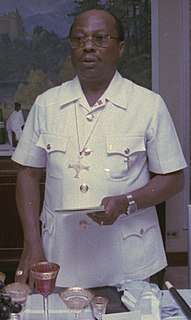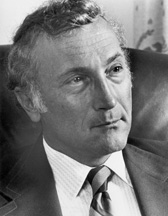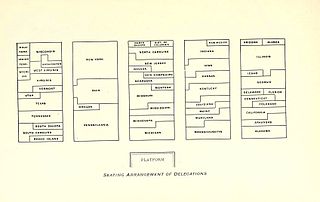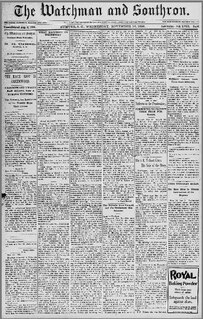Related Research Articles

The 1920 United States presidential election was the 34th quadrennial presidential election, held on Tuesday, November 2, 1920. In the first election held after the end of World War I and the first election after the ratification of the Nineteenth Amendment, Republican Senator Warren G. Harding of Ohio defeated Democratic Governor James M. Cox of Ohio.

The 1932 United States presidential election was the 37th quadrennial presidential election, held on Tuesday, November 8, 1932. The election took place against the backdrop of the Great Depression. Incumbent Republican President Herbert Hoover was defeated in a landslide by Democrat Franklin D. Roosevelt, the Governor of New York and the vice presidential nominee of the 1920 presidential election. Roosevelt was the first Democrat in 80 years to win an outright majority in the popular and electoral votes, the last one being Franklin Pierce in 1852. Hoover was the last incumbent president to lose reelection until Gerald Ford lost 44 years later. The election marked the effective end of the Fourth Party System, which had been dominated by Republicans.

The 1952 United States presidential election was the 42nd quadrennial presidential election and was held on Tuesday, November 4, 1952. Republican Dwight D. Eisenhower won a landslide victory over Democrat Adlai Stevenson II, which ended a string of Democratic Party wins that stretched back to 1932.

William Richard Tolbert Jr. was the 20th President of Liberia, a position he held from 1971 until 1980, when he was killed in a coup d'état led by Samuel Doe.

Frank Orren Lowden was an American Republican Party politician who served as the 25th Governor of Illinois and as a United States Representative from Illinois. He was also a candidate for the Republican presidential nominations in 1920 and 1928.

Richard Schultz Schweiker was an American businessman and politician. A member of the Republican Party, he served as the 14th U.S. Secretary of Health and Human Services under President Ronald Reagan from 1981 to 1983. He previously served as a U.S. Representative (1961–1969) and a U.S. Senator (1969–1981) from Pennsylvania. In 1976, Schweiker was Reagan's running mate during his unsuccessful presidential campaign.

The 1896 Democratic National Convention, held at the Chicago Coliseum from July 7 to July 11, was the scene of William Jennings Bryan's nomination as the Democratic presidential candidate for the 1896 U.S. presidential election.

From March 14 to May 19, 1944, voters of the Republican Party chose its nominee for president in the 1944 United States presidential election. The nominee was selected through a series of primary elections and caucuses culminating in the 1944 Republican National Convention held from June 26 to June 28, 1944, in Chicago, Illinois.

The Phoenix election riot occurred on November 8, 1898, near Greenwood County, South Carolina, when a group of local white Democrats attempted to stop a Republican election official from taking the affidavits of African Americans who had been denied the ability to vote. The race-based riot was part of numerous efforts by white conservative Democrats to suppress voting by blacks, as they had largely supported the Republican Party since the Reconstruction era. Beginning with Mississippi in 1890, and South Carolina in 1895, southern states were passing new constitutions and laws designed to disenfranchise blacks by making voter registration and voting more difficult.

Benjamin Franklin Randolph was an American educator, an army chaplain during the Civil War, and a Methodist minister, newspaper editor, politician, and state senator in the early part of the Reconstruction Era in South Carolina. Randolph was selected to be one of the first African American Electors in the United States at the 1868 Republican National Convention for the Ulysses Grant Republican presidential ticket. Randolph also served as the chair of the state Republican Party Central Committee. He was a delegate to the 1868 South Carolina Constitutional Convention, where he played an important role in establishing the first universal public education system in the state, and in granting for the first time the right to vote to black men and non-property owning European-American men. On October 16, 1868, Randolph was assassinated by members of the Ku Klux Klan.
Americo-Liberian people or Congo people or Congau people in Liberian English, are a Liberian ethnic group of African-American, Afro-Caribbean, and Liberated African descent. The sister ethnic group of Americo-Liberians are the Sierra Leone Creole people, who share similar ancestry and related culture. Americo-Liberians trace their ancestry to free-born and formerly enslaved African Americans who emigrated in the 19th century to become the founders of the state of Liberia. They identified there as Americo-Liberians. Some African Americans following resettlement in Canada also participated as founding settlers in Sierra Leone and other Recaptive repatriates settled in present-day Côte d'Ivoire.
James Dunlap Warren was an American newspaper publisher and politician from New York.
References
- ↑ Bainbridge, Judy. "South Carolina political history: Remembering 'Tieless' Joe Tolbert and his family". The Greenville News. Retrieved 2022-05-30.
- ↑ Wilk, Daniel Levinson (2002). "The Phoenix Riot and the Memories of Greenwood County". Southern Cultures. 8 (4): 29–55. ISSN 1068-8218.
- ↑ "Rock House". SC Picture Project. 2013-02-28. Retrieved 2022-05-30.